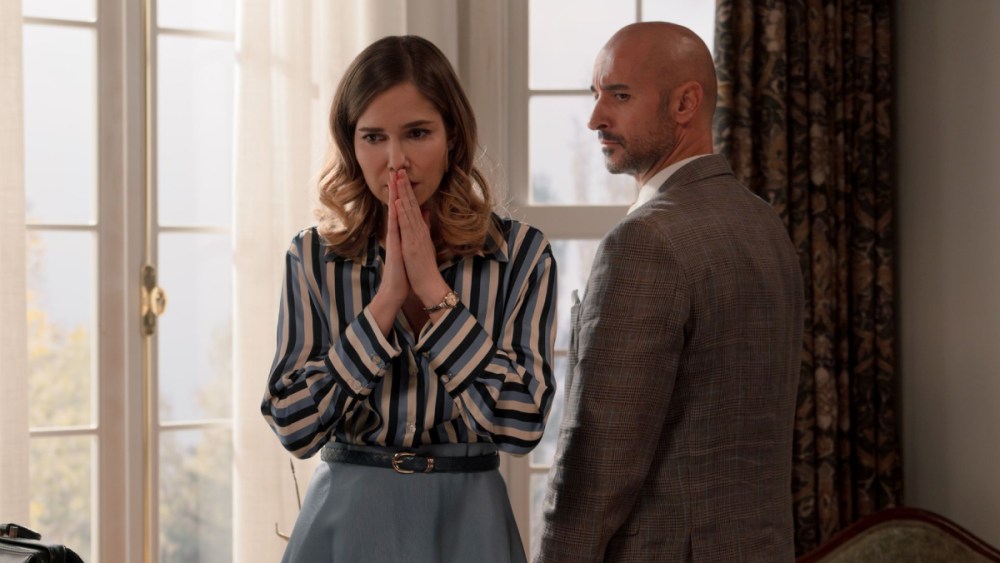Spain’s is rocking with its local TV fiction boom, but that is running mostly on one engine: the streaming services — far more than anywhere else in Europe. Yet the market is proving ever more flexible as players test new formulas to finance, launch and maintain hits.
In 2024, global streamers poured €2 billion ($2.2 billion) into Spanish original content — second only to the U.K. at €2.9 billion ($3.1 billion), and way above France and Germany (€8 million, $860 million each) or Italy (€7 million or $750 million), according to a recent European Audiovisual Observatory report.
Nearly 70% of Spain’s total content spend comes from streamers, compared to just 24% in France. That ratio defines the ecosystem. Yet many of Spain’s most resonant hits still originate with broadcasters. Diagonal TV’s “Sueños de libertad,” Atresmedia’s leading daily soap, has just sold to Latin America via HBO Max, as did RTVE-Bambú’s Emmy-winning telenovela “The Vow.”
Financing increasingly relies on streamers, however, whose weight makes them unavoidable partners on most new projects.
“Today, we simply cannot launch a series without involving a platform in the equation,” says 10.10.2025 23 Variety Ghislain Barrois, CEO of Mediterráneo Mediaset España Group and Telecinco Cinema. “Costs are too high and the pressure on talent and crews is enormous. Platforms bring oxygen, but they also reshape the rules of the game.”
Barrois adds, “We produce less so that we can push harder on promotion. The challenge isn’t so much producing a show; it’s making it stand out in a saturated market.” “Sueños de libertad,” with 1.3 million daily viewers on Antena 3, also serves to illustrate the streamers’ growing appetite for daily soaps. Beyond leading Spanish free-to-air afternoons, the series is also available on Atresplayer, Movistar Plus+ and Disney+.
“Our system of exploiting fiction is a 360-degree model, allowing the series’ journey to be much longer and therefore more profitable,” says Montse García, Atresmedia’s head of fiction. “Free-to-air fiction still has its audience. That level of loyalty is extremely difficult, which is why we’re very proud,” García adds. “They have to impact viewers on a higher level than series on platforms, because it means your audience has to tune in every day/week at a specific time.”
Few projects reach the screen today without multiple partners across windows. “Padre no hay más que uno, la serie,” an adaptation of Santiago Segura’s blockbuster film franchise, is a case in point. Produced by Bowfinger Intl. Pictures with Sony Pictures Intl. Prods., Atresmedia and Prime Video, the family comedy shows how flexible Spanish players have become. Mediterráneo’s “La Favorita 1922,” a period drama by Bambú, first aired on Mediaset España’s Telecinco, then on Mediaset Infinity and Netflix. It pre-sold to more than 20 territories.
“From development to production, and the campaign around launch — it was a demonstration of confidence I hadn’t seen in years,” recalls Bambú founder Ramón Campos. “My conclusion is that we need shorter episodes, so watching doesn’t feel like an effort.”
Independent producers are adapting. “From the start, we worked almost entirely with originals,” says Anxo Rodríguez, founder of Espotlight, producer of Prime Video’s “Los Farad” and “Dime tu nombre,” as well as “Un nuevo amanecer” for Atresplayer. “But budgets are bigger, and the market more saturated. Exploring licensing was the next step — for that, you need financial muscle and partners who are close to distribution.”
ESpotlight’s pact with Sony Pictures Television gives that cushion, offering first-look support and distribution muscle. “Packaging now resembles assembling indie films.”
For Izen Group, part of France’s Studio TF1, the math is similar. “Originals give visibility but limited margins,” explains president José Velasco. “Licensing involves more risk, but it returns the producer to their true role: taking creative and financial responsibility.”
Co-production is another answer — and Spanish players are leaning in. In the drama “Puberty,” actress-writer-director Leticia Dolera (“Perfect Life”) is backed by Distinto Films, Corte y Confección de Películas, Uri Films and 3Cat and Belgium’s AT-Prods., with Beta Film handling sales, and HBO Max taking rights to Spain and Portugal.
Movistar Plus+ has teamed with Banijay’s DLO Producciones and Arte France on Alberto Rodríguez’s “The Anatomy of a Moment,” while Alea Media’s Aitor Gabilondo is partnering with Chile’s Fábula to adapt Isabel Allende’s “A Long Petal of the Sea.”
The Mediapro Studio is co-producing “Raza Brava,” the new series from Hernán Caffiero, alongside DeCulto, Atómica Group and Erik Barmack’s Wild Sheep Content. Plano a Plano co-produces thriller “Innato” with L.A.’s Dynamic TV, set for Netflix Spain.
Meanwhile, Secuoya Studios is shooting “Arcadia” with ViX, William Levy Entertainment and SkyShowtime in Spain aboard. Eyeing Europe, Secuoya operates a first-look deal with the U.K.’s BlackBox Multimedia and a partnership with France’s Sydney Gallonde.
Spain’s sizeable tax breaks have drawn foreign shoots and strengthened the local industry. But execs stress regulation must keep pace.
“Spain needs not only attractive tax incentives but also legal certainty and flexible, competitive regulations across all areas — including labor — to remain a truly attractive production hub,” says Sara Fernández-Velasco, Izen’s CEO.
